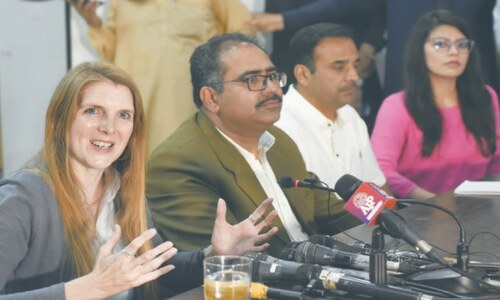RAWALPINDI: The Water and Sanitation Agency’s (Wasa) deficit for the fiscal year 2017-18 has increased to Rs1.2 billion.
The agency has adopted austerity measures for the last six months which did not work and also resulted in the late payment of salaries. Wasa Workers’ Union has threatened to stop water supply if the provincial government did not streamline the payment of salaries.
“The two main reasons for the widening of the gap between income and expenditure include increased electricity bills and increased salaries of employees,” a senior Wasa official told Dawn.
More than 100 new tubewells were installed in the city areas which meant an increase in the number of employees and in electricity bills.
Gap between income and expense has widened due to increased electricity bill, salaries
He said salaries of government employees were also increased in the current fiscal year.
“Wasa relies on charges for water supply and sewerage facility charges to pay utility bills and salaries. However, income has not increased in the last 10 years as the Punjab government stopped the agency from increasing water tarrif,” the official said, and that water charges usually increase every three years.
He added that Wasa charges Rs98 per month from five marla houses while the neighbouring Capital Development Authority and the Rawalpindi and Chaklala Cantonment Boards charge Rs500 and Rs750 per month respectively.
He said the reason Wasa charges less is that the Punjab government gives it an annual subsidy of Rs200 million, which he said is not enough.
Work on laying water supply lines was started on grants of the provincial government and most projects were included in annual development program of Punjab, he said.
Wasa Workers Union President Raja Javed told Dawn that workers’ salaries were delayed every month because the administration says it is facing financial problems.
He said the dues of those workers who have left the agency are pending too as are overtimes for the last month.
Wasa Managing Director Raja Shaukat Mehmood told Dawn the agency is working on improving recovery.
“We recovered more than Rs300 million till March which is still not enough to even pay salaries and the electricity bills of 10 tubewells in the city areas,” he said.
He added that recovery was still better than last year after the detection of more than 22,000 illegal water connections which were brought into the tax net. He said the number of water consumers has increased from 104,000 to 126,000 in the city including 13,000 commercial units. He said the number of consumers has increased in the city after the inclusion of Potohar Town’s 12 urban union councils in the ambit of the civic agency for water supply and that the tubewells and pumping machines are switched on for 12 hours. Wasa’s electricity bill has increased from Rs200 million annually to Rs300 million, he said.
Published in Dawn, March 8th, 2018














































Dear visitor, the comments section is undergoing an overhaul and will return soon.